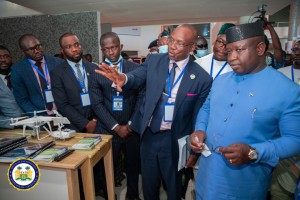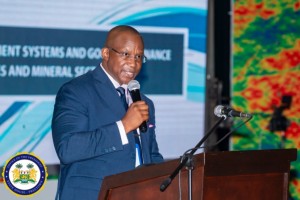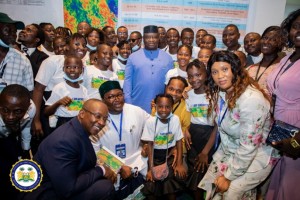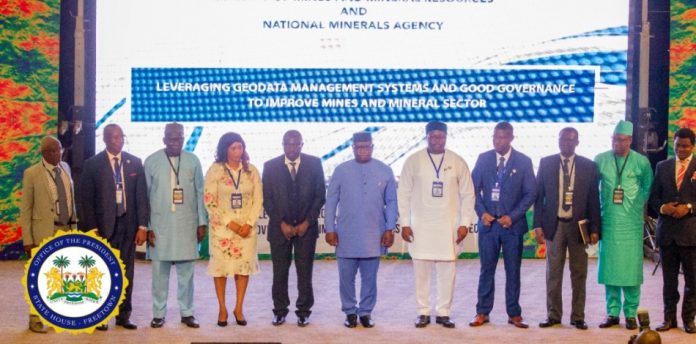By Amin Kef Sesay
The 24th May 2021 will go down the annals of history as a watershed when the Ministry of Mines and Mineral Resources (MMMR) and the National Minerals Agency (NMA) held a Geodata Launch and an Exhibition Event at the Freetown International Conference Centre, Bintumani Hotel, Aberdeen to celebrate and showcase progress made in the country’s minerals sector.
The event provided an opportunity for investors, mining companies, banks and financial institutions, legal firms and various product/service providers to join Government Ministries, Departments and Agencies, Development Partners and other key stakeholders to share experiences and ideas on the investment opportunities and challenges in the mines and minerals sector.
In his keynote address, President Bio said: “I am not here to do a symbolic launch and walk away to my office. I am here to speak to friends, partners, and potential investors present and not present. I am here to share with you what we have done about the mining sector over the last three years.”
The President also stressed that he was at the event to listen very keenly to people’s thoughts, ideas, and experiences.
“I want to assure you that we will create even more opportunities to sit down and talk; to think together; to cooperate; to reach consensus; and to work together to further develop the extractives sector and make it even more viable for investors and their shareholders, the Government, communities, and the country as a whole.
“As I have always said, I want that relationship to be built on mutual trust with all parties being transparent, patient, and clear about pursuing a win-win outcome,” he concluded.
Gayle Martin, the outgoing World Bank Country Manager, commended the Government of Sierra Leone under the leadership of President Bio for the progress that led to the event of the launch of Geodata and Exhibition, saying that critical to the post-COVID-19 recovery was the extractive sector, which she said if managed well would transform Sierra Leone’s economy.
She also noted that the Geodata was financed by the World Bank because they knew it would help lift people out of poverty, saying that the data would not only support the mining sector but would also help other areas necessary for national development.
“Under the able leadership of President Bio, the Government has embarked on a growth strategy that focuses on economic diversification. Economic diversification does not mean moving away from extractives, but rather to optimise the growth in other sectors to protect the economy from negative shocks”, Gayle noted.
Minister of Mines and Mineral Resources, Musa Timothy Kabba, said that he was grateful to the President for the confidence reposed in him to serve in the Ministry, saying that they had taken huge steps by acquiring the geological data which would be critical for the optimisation of benefits from the minerals sector.
He further stated that the Geodata would serve a useful function in guiding Government’s decision relevant to the exploitation of mineral wealth, adding that they were critical in shaping Government’s strategy in transitioning from a first-come-first-serve system for the award of mineral right to a competitive bidding system.
“With this launch, Your Excellency, Sierra Leone has once again demonstrated, under your leadership, that it is a competitive destination in Africa for investment in the mines and minerals sector,” he noted.
The Director General of the National Mineral Agency (NMA), Julius Daniel Mattai, in his welcome address said despite challenges posed by the Coronavirus converging at the Bintumani Conference Centre clearly shows that the country is making steady progress in sanitising the minerals sector.
“Ladies and gentlemen, this Geodata launch and exhibition form a critical part of our Government’s agenda to rebuild confidence and attracting investment into the minerals sector of Sierra Leone’s economy. This maiden event provides a perfect setting for long-lasting and meaningful investment in this country and for its development,” he noted.
He also stated that Sierra Leone is endowed with abundant mineral wealth and natural resources but characterised by multidimensional poverty, but assured that the Ministry of Mines and Mineral Resources and his agency are working harder to see a turnaround and a much further inroad in terms of growth in the sectors with large investment potential.
The NMA Director General furthered that the event consists of three opportunities: first, the launch of the deliverables from the Nationwide Airborne Geophysical Survey (NAGS), the Enterprise Geoscientific Information System (EGIMS) and the National Minerals Agency Strategic Plan 2020-2025; second, promotional exhibitions; and, third, an exclusive Networking Cocktail Party.
He underscored that the event provides the perfect setting to see these three opportunities unfold for the first time in Sierra Leone.
Julius Daniel Mattai highlighted that so pivotal has mining been to the development of Sierra Leone, that it inevitably carries some of the worst of the legacy of the past.
He stated that in the same measure, the challenges of Geodata management and good governance and the opportunities of real transformation are enormous, especially in creating new opportunities for meaningful investment and inclusive growth.
These challenges and opportunities, according to him, form a critical part of the broader transformational agenda of Sierra Leone’s mines and minerals sector in the twenty-first century; hence, the theme of the event is: “Leveraging Geodata Management Systems and Good Governance to Improve the Mines and Minerals Sector”.
He maintained that the role of the mines and minerals sector in the economic development of Sierra Leone is still a suspect and the sector is currently striving to make meaningful impact on the country’s overall economy.
“It is perhaps an inconvenient truth that Sierra Leone would be much further down the road in terms of growth of the mines and minerals sector had it taken a comprehensive stock of its mineral resource inventory earlier,” he intimated.
He added how Sierra Leone has serious mining investment potential, which if governed and exploited rationally, could contribute to inclusive and sustainable development.
The mining sector, he continued, is the crux of Government’s effort to revive the country’s economy through the attraction of investments with its proven associated benefits such as generation of critically needed foreign exchange, employment creation and transfer of technology and knowledge.
He said at a time of continued global economic and financial vulnerability due to the COVID-19 pandemic, the Government of Sierra Leone, under the astute and transformational leadership of HE Dr Julius Maada Bio, has yet again proven its commitment to making Sierra Leone’s mines and minerals sector as one of the key pillars of our national development agenda.
Julius informed the gathering that the lack of quality, complete, reliable and readily available Geodata has seriously affected and weakened the Government of Sierra Leone’s ability to assess the grade, quality, quantity, depth, orientation size, shape, etc of its mineral resources and ore reserves in the areas under exploration and exploitation.
He continued that it is for such a reason that the Government of Sierra Leone, through the Ministry of Mines and Minerals Resources and the National Minerals Agency, commissioned a high-resolution Nationwide Airborne Geophysical Survey (using magnetic and radiometric sensors) covering the entire country during 2019 and 2020.
The NMA Boss acknowledged that the Survey was fully funded by the World Bank through its Extractive Industries Technical Assistance Project 2 (EITAP 2).
“The Sierra Leone Nationwide Airborne Geophysical Survey is the highest resolution countrywide magnetic and radiometric survey ever conducted in Africa with 150 m line spacing and nominal flight height of 50m above ground level,” he noted stating that the unprecedented level of subsurface detail provides unique opportunities for mineral exploration in a country already well known for its mineral wealth, but with untapped potential for modern minerals essential for transition to a green and low-carbon future.
He said the deliverables form the Survey are also useful in water resources management, including hydrogeology and geohydrology; agriculture and agrogeology; environmental management; geotechnical and engineering works; and urban planning, all of which ultimately assist in societal development.
“The deliverables from the Survey now form a critical component of our geological and mineral resource inventory and will be globally available, for an affordable fee, to the public and investment communities from early June 2021 via a bespoke online Sierra Leone Geoscience Portal and from the NMA Head Office in Freetown,” he stated.
The NMA Boss stated that Geodata are very important and strategic national assets and they are costly to acquire and challenging to store, manage and secure over a long period of time.
“Hence, we must invest in the mines and minerals sector and motivate, inspire and empower our young men and women with the relevant knowledge, skills, professionalism, attitude and integrity to govern, manage and administer Geodata and its management systems,” he admonished.







